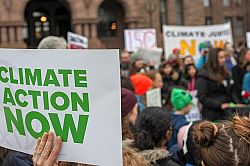

According to new data from leading US climate scientists, nearly a quarter of the world's population experienced a record hot year during 2021, as the climate crisis continues to exacerbate temperatures across the globe.
A new annual analysis from NASA and the National Oceanic and Atmospheric Administration (NOAA) has found that last year was the sixth hottest ever recorded, with the global temperature 1.1C above the pre-industrial average. Bill Nelson, the Administrator of NASA, has said that eight out of the top ten hottest years have occurred in the past decade, and that "underscores the need for bold action to safeguard the future of our country – and all of humanity". NOAA and NASA undertake their own temperature analyses in slightly different ways, using data from weather stations, ships and ocean buoys.
Record high temperatures were felt in parts of Northern Africa, South Asia and South America last year, whilst the Arctic Sea ice continued it's decline and the oceans recorded another record year for heat content. A senior climate scientist at NOAA, Russell Vose stated that, "if it weren’t for the large heat storage capacity of the oceans, the atmosphere would’ve warmed a lot more rapidly."
The director of NASA's Goddard Institute for Space Studies, Gavin Schmidt, has said the changes in the Arctic (which is warming at about three times the global average) are "extremely dramatic", and will affect the rest of the world through rising sea-levels from melting glaciers (among other issues).
While 2021 did not top the heat record set in 2020 (a value that was only fractionally hotter than 2016), scientists have said that last year was yet another demonstration of the long-term global heating caused by human activities, such as burning fossil fuels and deforestation. Concentration of carbon dioxide in the atmosphere levels are now at heights not seen on Earth in the past 4 million years. "It’s clear that each of the past four decades has been warmer than the one preceding it," Vose commented. "It’s certainly warmer now than at any time in the past 2,000 years, and probably longer."
Earlier in the week, the European climate agency, Copernicus, said that 2021 was the fifth hottest year on record, adding that the last seven years were the hottest ever documented - a slight edge was taken off last year's temperatures by a La Niña, a periodic climactic event that cools the waters of the Pacific Ocean.
Irrelevant of whether 2021 was the hottest individual year on record, it did contain a number of extraordinary signs of climate breakdown - July was the world's hottest month ever recorded, with Death Valley in California possibly recording the hottest ever temperature measured reliably during this month: 54.4C (130F).
According to a different analysis released by Berkley Earth, the total of people living in countries that experienced their hottest year on record is approaching a quarter of the world's population - 1.8 billion people. On top of this, a total of 25 countries (including China, Nigeria and Iran) recorded a record warm annual average in 2021. Robert Rohde, the Lead Scientist at Berkeley Earth, has said, "No one lives at the global average temperature. Most land areas will experience more warming than the global average, and countries must plan their responses to this."
A litany of disasters seen last year were also determined to be worsened by the world's excess heat. Floods devastated parts of Germany and China whilst the Pacific North-West of North America saw a deadly, unprecedented heat wave, something scientists have claimed would have been "virtually impossible" without climate change.
A Senior Climate Scientist at the Union of Concerned Scientists, Kristina Dahl, has said, "What terrifies me is that these facts and figures are no longer surprising or shocking. Rising temperatures are already triggering dire impacts worldwide, and will only worsen as the planet warms."
At the Paris climate accords, the world's Governments agreed to the limit the global temperature rise to 1.5C above pre-industrial times, in order to avoid disastrous climate change, but this threshold is now in view, with a 50% chance at least one year this decade will hit 1.5C. Vose said, the average temperature is to reach this level "sometime in the 2030s and certainly by the 2040s" if planet-heating emissions are not cut. He added that 2022 will probably be in the top 10 hottest years, with a small chance of it being the hottest on record "without something like a volcano erupting or a comet slamming into Earth."